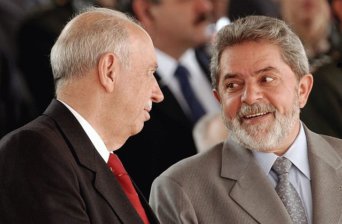- About
- Topics
- Picks
- Audio
- Story
- In-Depth
- Opinion
- News
- Donate
-
Signup for our newsletterOur Editors' Best Picks.Send
Read, Debate: Engage.
During 13 years in power, the Workers' Party (Partido dos Trabalhadores or PT) transformed Brazil. It distributed wealth, taking millions out of poverty and launched substantial housing initiatives. Whilst, as a result of implementing a new quota system, the number of black students attending university doubled. However, the PT years of governance were not free of mistakes: they made social reforms that depended excessively on profits from oil exports and later on debt, failing to consolidate the reduction in inequality.
It was also under the Workers' Party presidency of Dilma Rousseff that the government granted autonomy to the judiciary powers in order to investigate political corruption, even within PT politicians. What could have been an important step towards the separation of powers in Brazil has, nevertheless, led to untoward consequences, given the lack of impartiality in the Brazilian courts’ recent judicial actions.
Last week, former president Luiz Inacio Lula da Silva was sentenced to 12 years imprisonment on charges of passive corruption and money laundering. The charismatic leader of PT, former metalworker and trade unionist, was accused of favouring a company in exchange for an apartment in the state of São Paulo. The process, however, is far from exemplary because of procedural irregularities alongside a lack of convincing evidence and the trial being brought forward due to the electoral calendar.
The verdict is likely to make it impossible for Lula da Silva to participate in the elections that will take place in October this year, despite the leader of the PT, the most popular in Brazilian history, leading all polls.
Moreover, the episode comes only a few months after the controversial impeachment of President Dilma Rousseff, for actions that are now considered legal: a manoeuvre that temporarily made the federal budget deficit look smaller than it would otherwise appear. Although possibly the most honest president in the history of Brazil, Rousseff was dismissed in a parliamentary move that many Brazilians consider a coup. Whilst there have been no corruption charges against her, suspicions hang over her successor, Michel Temer from the opposition, right wing MDB party.
The recent judicial actions, therefore, add to the suspicions of the political nature of the trial, whose sole purpose seems to be preventing Lula da Silva from running for the presidency. Brazilian democracy is thus in grave danger: elections must be won at the ballot box and not in court.
Photo: Luiz Inacio Lula da Silva (r) in 2004 by Marcello Casal Jr/ABr.(Agência Brasil)/wikipedia
